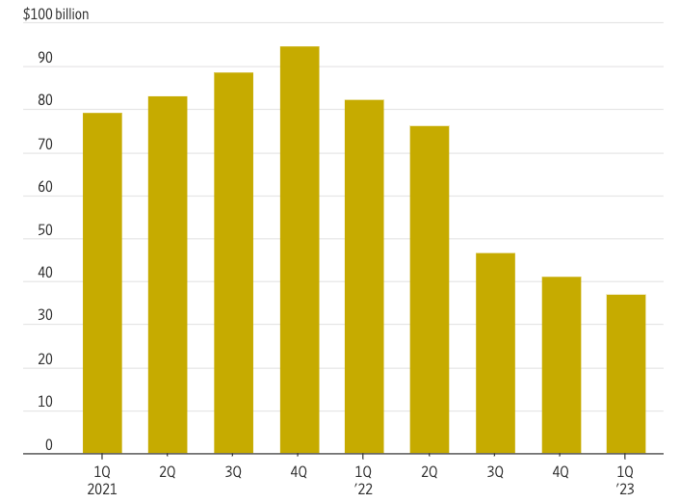The number of startups in the US giving up, unable to raise money for their ideas amid the downturn in the venture capital market, is increasing.
Starting a business in the U.S. is becoming increasingly difficult. Funding from venture capitalists and banks is becoming scarcer and more expensive. IPOs are almost impossible, and some business models that thrived when cash was cheap (low interest rates) are now unsustainable. Startups backed by venture capital funds are running out of money and facing difficult choices, according to the WSJ .
In recent months, several startups that had previously raised significant investment capital have had to close down. Examples include the biotechnology company Goldfinch Bio, the wine retailer Underground Cellar, and the fintech company Plastiq.
Zume, a California-based company specializing in developing a robotic pizza maker and once valued at $2.25 billion, is moving toward dissolution under the supervision of restructuring firm Sherwood Partners.

Zume's pizza-making robot. Photo: AP
"A mass exodus of startups is happening," said Tom Loverro, Managing Partner of IVP. No startups his fund has invested in have closed recently, but Loverro says the wave of startup failures has only just begun. "It's like the whole industry had a wild night out and now it's suffering the consequences," he quipped.
Some observers believe that the venture capital boom in 2021, as well as government funding for small businesses during the pandemic, likely helped startups survive longer than usual. Now that those funding sources have dried up, the collapse is inevitable.
Barry Kalander, president of KalanderGroup, a company that provides business restructuring and dissolution services, said that most of the companies they are dealing with should have ceased operations a year or two ago.
Venture-backed startups raised $346 billion in 2021, according to a PitchBook-NVCA Venture Monitor report. Investors and founders say many companies are still surviving thanks to that money. Some hope to weather the current storm, wait for the market to recover, and then seek an IPO to tap into the public market.

Venture capital investment in US startups by quarter. Graphic: WSJ
Meanwhile, the venture capital market continues to decline. US startups raised $37 billion in the first quarter, down 55% from the same period in 2022. The longer this market downturn lasts, the closer many startups will get to bankruptcy.
On December 31, 2022, the real estate startup Watson Living was forced to close, according to co-founder and former CEO Andrew Firestone. Prior to that, in 2021, Watson Living had raised $2.5 million in a seed round, valuing the company at approximately $15 million. However, their product was deemed too complex and impractical, according to Firestone's own admission.
Watson Living therefore closed down and returned less than 10% of the capital to investors. "The market has changed, and the time we had to adjust was significantly shortened," Firestone explained. He has now started a new business in a different industry.

Andrew Firestone, Co-founder of Watson Living. (Photo provided by the subject)
Researchers say that historically, data on the number of startups that have shut down has been difficult to track accurately, even though successful companies are rare. Approximately 45% of the 1,100 startups that raised seed funding in 2017 never raised further capital, according to Carta, a software provider for investment funds.
Achieving a significant result is even rarer. Approximately 16% of startups are successfully acquired or go public within seven years of raising their first venture capital fund, according to data on nearly 5,000 U.S. companies that raised initial capital between 1995 and 2013.
This research was conducted by Honggi Lee of the University of New Hampshire, Lia Sheer of Tel Aviv University, and Matt Marx of Cornell University. Lee said that failure rates can increase during a recession. "If startups don't have money, they can't operate," he said.
Samantha Ettus, founder and CEO of fintech firm Park Place Payments, which has raised $4 million in venture capital, had to act quickly when the largest investor in its most recent successful funding round failed to transfer funds last September.
Ettus cut costs, raised $440,000 in bridge financing from existing investors, and hired an investment bank to sell Park Place. "When I started the company, we said we were going to build a billion-dollar company. I never intended to sell so soon," Ettus said. As a result, Logiq acquired Park Place in April in an all-equity deal worth over $6 million.
Other startups are looking to pivot, changing their business model or product. Last year, a fintech firm's lender tightened the terms of its pending loan. Marc Escapa, co-founder and co-CEO, said the requirements made the business plan unfeasible.
The company recently raised $6 million but can no longer pursue its planned auto loan offerings. It's pivoting and selling its loan initiation software under the name Fuse Finance.
Escapa was pleased that his startup had found a new business direction that worked well. However, experience also showed that macroeconomic trends beyond a company's control could render an idea unfeasible. "The fundamental principles of what you're about to build no longer hold true," he said.
Phiên An ( according to WSJ )
Source link




![[Photo] Nhan Dan Newspaper celebrates the 96th anniversary of the founding of the Party.](/_next/image?url=https%3A%2F%2Fvphoto.vietnam.vn%2Fthumb%2F1200x675%2Fvietnam%2Fresource%2FIMAGE%2F2026%2F02%2F03%2F1770093917726_z7495755471262-66d965cdf06fce4e837f306802ae37b1-7408-jpg.webp&w=3840&q=75)


























![[Photo] Standing Committee member of the Party Central Committee Tran Cam Tu presents the Decision appointing the Secretary of the Party Committee of the Ho Chi Minh National Academy of Politics.](/_next/image?url=https%3A%2F%2Fvphoto.vietnam.vn%2Fthumb%2F1200x675%2Fvietnam%2Fresource%2FIMAGE%2F2026%2F02%2F02%2F1770039902160_le-cong-bo-bt-hvctqg-11-7880-jpg.webp&w=3840&q=75)







































































Comment (0)